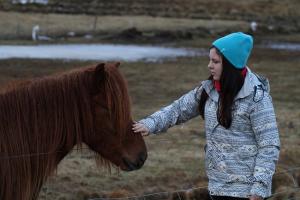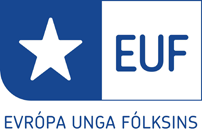
10 unusual things you can learn while volunteering at SEEDS
28.10.2016

I spent six months as an EVS volunteer in Iceland. My main job was taking care of the workcamps organised by my host organisation - SEEDS Iceland - all over the island: from Reykjavik to the Iceland villages.
I thought I would become a better leader, experience life in an international environment, test myself in extreme situations. And that is what happened, but I haven’t expected to also learn...
...how to knit traditional Icelandic jumpers
I’ve never been particularly gifted manually, I would try an occasional origami or sketching, but I’ve never seen myself as a talented individual. It all changed after I arrived in Iceland and found myself in an environment where everyone, as a way of battling cold and humidity, wears wool jumpers with beautiful designs around the neck. The first thing any newcomer wants then, is to get one of those. Hand-knitted jumpers made with Icelandic wool usually cost over 700 zlotys, while the wool you need to make them is less that 200. You just have to know what to do with it. I was lucky because some of the volunteers I met already knew the art of knitting and were willing to share their knowledge. That’s how I made my first jumper. And then the next one. And another one, as a gift. Then my friends started asking me to knit something for them. And then I thought - it’s time to do something about it. That’s how, after I got back home, an idea for my own mini-business was born - a fan page called Jigsknits, where I offer to knit jumpers of any size, colour and pattern. Since I set it up I knitted about 15 jumpers and many hats and gloves.
...how to live without the Internet
To us, Poles, Scandinavia seems modern and developed. That’s why I thought I would constantly keep in touch with my family thanks to the Internet. The truth is, not many people have high-speed networks, and it’s not unusual for people to enter cafés just to download bigger files; even without buying anything at the bar. And that’s all in Rykjavik, Iceland’s capitol. It gets even more complicated in the countryside. To the point where you end up standing in a field, surrounded by sheep, waving your hand just to send one email using the Internet from the nearest B&B. To make things even better, half-way through my stay there my laptop broke down and getting new parts from Asia took the other half of my time there. Turns out you can’t live without technology.
...that you can’t always buy everything
There’s absolutely nothing philosophical about that sentence, although I agree that money can’t buy you happiness. It’s just that even having big money there’s not a lot to buy on the island. Despite Iceland having the highest allowance for the EVS volunteers in the whole of Europe, the money only gets you a few leisure activities (swimming pool, cinema, concerts) each month. Luckily the host organisation provides food, lodgings, and transportation. Managing one’s allowance is individual for every volunteer, so you can spend it all during one night in a pub or use for, let’s say, travelling. It teaches you to search for fee ways of spending time - it turns out a lot of concerts have free entry, you can “sneak” into an art show or use your volunteer ID and ask for discounts.
...that you are responsible for your own trash
Literally. Recycling in Iceland works in a very interesting way. You do segregate the trash but then you have to take it to the landfill yourself and, also by yourself, put it in the appropriate containers standing on platforms in different parts of the landfill. That’s a weekly car trip across town in order to put your trash in the proper bin. It does teach environmental responsibility, doesn’t it?
...that you can be vegetarian while being a carnivore
Iceland is an island in the middle of the ocean; you’d think fish would be an essential component of any diet there. But the truth is you’re more likely to find mutton than fish in any Icelander’s diet. Both fish and sheep meat is very expensive there. Not to mention beef - the only McDonald’s on the island went bankrupt because of its high price. Iceland is also known for its whaling. But the Icelanders themselves rarely eat whale meat and it’s mostly the tourists who are hungry for new experiences that keep the cruel dealings alive. The only meat available for a reasonable price is not the best quality. In the end I was mostly on a vegetarian diet there, which taught me how to experiment in the kitchen and that you can create miracles from vegetables.
...that to nature we’re nothing
In Iceland, unlike anywhere else, you can feel the power of nature. And it’s not just about the breathtaking glaciers, waterfalls, and volcanoes. Nature really affects your life. It might mean not being able to go out to the cinema with your friends, because the wind is so strong you can’t open your front door. If it’s snowing in May - you can’t leave the sheep on the pasture. If the entire island is paralysed by a snow storm - you have to wait it out, paying several hundred zlotys for a night at the nearest hotel. That’s where the Icelandic approach to life comes from and which you can sum up with a popular saying Þetta reddast, which means that all will be well eventually.
...how to build houses in Iceland
For my last workcamp I went to the Western Fiords - a rugged piece of land on the North of Iceland. The camp host was a two-time Olympic representative of Iceland in cross-country skiing. When he was younger, his career was supported by the Ísafjörður community, currently the biggest Fiord city which has... 3 thousand citizens. Years later he became an architect and decided that he wanted to pay the town back for their help. His plan was to build a tourist cabin by himself and give all the profits from renting it to the local skiing organisation. And it so happened that all of the workcamp participants were girls. For two weeks we drilled, cut wood, poured cement, hammered nails. After work we would come back to the shelter on top of the mountain where there was snow all year, even though the sky never got dark in June.
...that alcohol is not the same anymore
In Poland it’s pretty standard to go out for a drink with your friends in the evening. In Iceland there’s a completely different culture of drinking alcohol, and so is the country’s policy. You can only get alcohol stronger than 0.5% in state shops which are open until 6PM in the capitol, and in the countryside they might even be only open for an hour a day. You can always get beer in bars, but on Saturday nights you have to pay about 35 zlotys to get it. There’s a useful app that tells you which bar and when is offering drinks with a discount. But there’s something worse than how much you have to pay for alcohol in Iceland. It’s what the Icelanders drink. The traditional strong alcohol is a black liquorice vodka, or a herbal-anise one, with which you chase a piece of rotten shark. Disgusting.
...how to grow carrots in Iceland
For a month I was sent to a farm located on the most Southern end of Iceland. Along with the other workcamp members we took care of cows and sheep. We also grew, or tried to grow, carrots. Because of Iceland’s severe climate the process is much more complicated than in continental Europe. First you have to plant the seeds, then make foil tunnels which serve as greenhouses and increase the temperature inside. Next you have to grow grass all around the area, so the wind doesn’t blow the precious seeds away; and pat the seeds into the ground, so the greedy birds don’t peck them out. And that’s just until the first gale ruins everything and you have to start all over again.
...that Polish isn’t the hardest language in the world
The host organisation of EVS provides the volunteer with a basic language course of the country they’re about to go. Having a year-long training with Swedish, I was full of hope starting with Icelandic. But the language practically hasn’t changed for the last thousand years, so most of the similarities between Icelandic and Swedish or Norwegian are quite superficial. Additionally, the Icelanders translate everything: so a hot-dog is pylsa and Batman... Leðurblökumanninn. Seriously. And because all Icelanders speak English, you often take the easy road and abandon the Viking tongue.
Katarzyna Płachta
First published: https://europa.eu/youth/pl/article/46/37875_en







